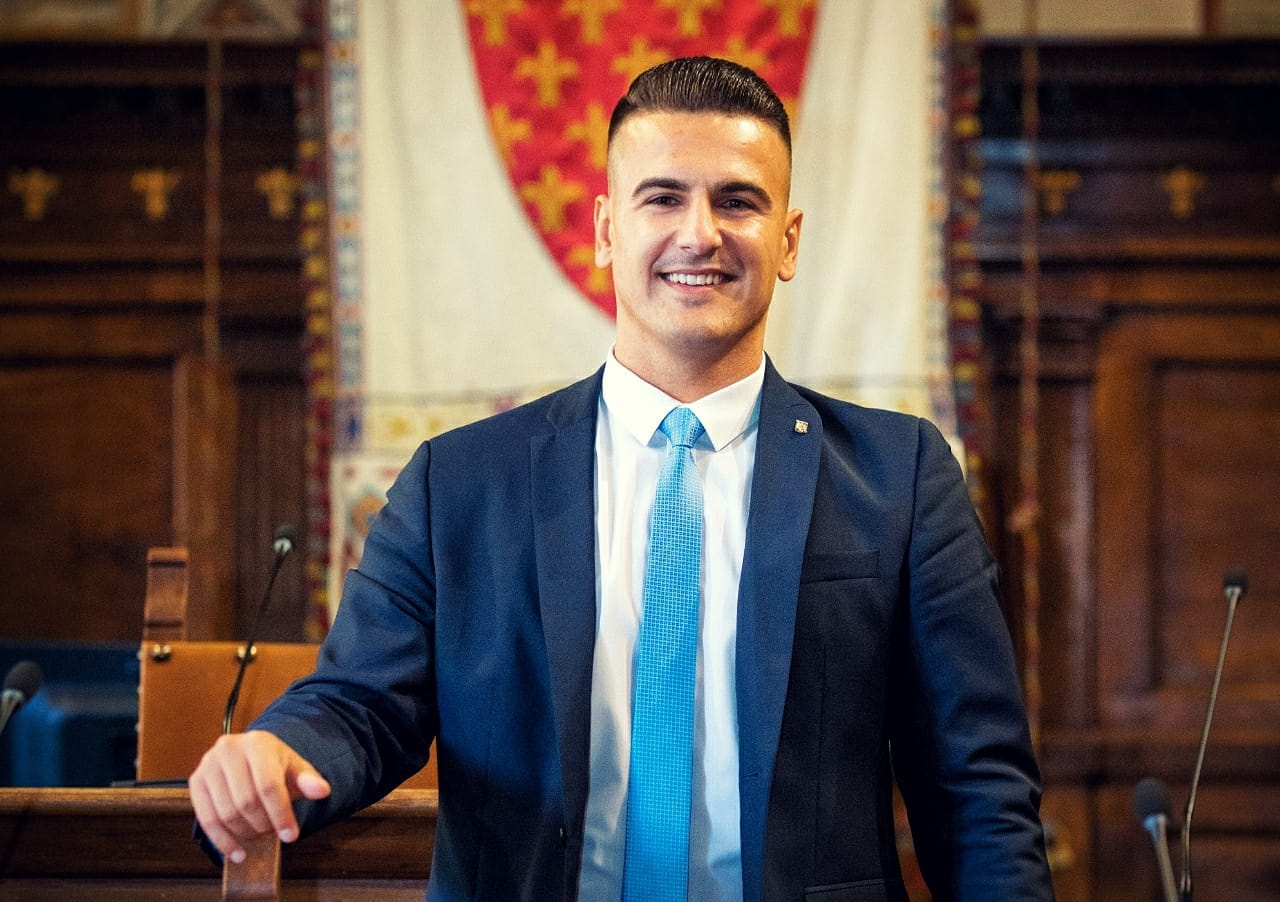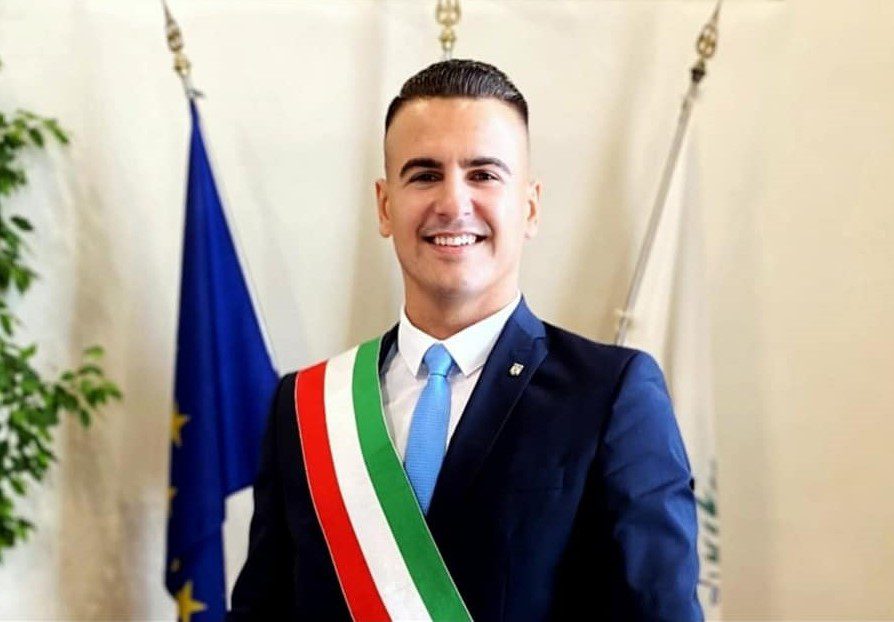
Claudiu Stanasel, entrepreneur and vice president of the Prato Municipal Council, is a young and rising star in Italian politics. Born in Romania, he grew up in Italy and has been involved in conservative politics since he was a teenager. In this interview, he discusses growing up in Italy as a Romanian, his experience working in right-wing politics, his election as vice president of Prato, and his hopes for the future of conservatism in Italy and Europe.
I’ve lived in Prato, Italy, since I was 6 years old. I have always been welcome here and I have so much gratitude for everyone here who has believed in me. Throughout my schooling, I had teachers and classmates who were always helpful and collaborative with me, and thanks to whom I was able to follow a path I am proud of. I integrated quickly, and I believe that this is largely due to the welcome I received.
I got involved in politics at the age of 17 when I ran as a candidate in the student elections of ITIS Buzzi, one of the most important schools in Prato with over 1,600 students. Together with my team, I was elected as a student representative. I was the first foreign student to fill this role.
Yes, I was approached by various youth movements, and I soon found myself part of the young people of Forza Italia, a centre-Right political party. In April 2014, encouraged by a committee of students and student representatives from Prato, I ran as a candidate in the administrative elections. When I was 18, I received 185 votes. I was 7th in the standings in the Forza Italia list, although I missed being elected to the city council by a few votes.
I began a long journey of political activity as a member and then a manager in Forza Italia, and two years later I opened my business, a logistics company that I still own today. In December 2014 I started the project Youth meets Politics, a format of student assemblies based on the dialogue between young members of Italy’s main political parties and high school students. Through this project I have been able to visit more than 300 high schools throughout Tuscany and Italy generally. In 2017, I was appointed regional head of the schools sector of Forza Italia, the first Romanian citizen with a regional political position in an Italian political party. Forza Italia was my first political party. It was with them that I was able to begin my career in politics which allowed me to gain lots of experience in a short time. I will always have respect and gratitude to Forza Italia for having given me these opportunities.
In December 2018, after more than 5 years in Forza Italia, I joined Matteo Salvini’s League. I believe in many of the Lega’s values and ideals. I am a centre-Right politician in one of the most left-wing regions of Italy and I have been advocating for my ideals and values since the beginning of my political activity. In 2019, Lega decided to nominate me, a 24-year-old young man born in Romania, for the administrative elections on one of the most sought-after electoral lists in Prato, a city with 200,000 inhabitants and which has seen over 800 candidates. My team and I demonstrated that it was a winning choice. I won 442 votes, topping the Lega list in Prato and was one of the most successful Lega candidates in the municipalities that voted from 2019 and 2022 in Tuscany. I was also the most successful centre-right candidate in Prato.
Lega promotes well-integrated foreigners who love Italy and who work every day to make this country better. In a time when values and ideals come and go, change from one party to another based on the needs for this or that election, this party and the entire centre-Right coalition, in my opinion, have always maintained its line, while also improving and updating some aspects and. The coalition’s effectiveness is clearly illustrated by the measures and proposals that become reality through our councillors, our mayors, and our regional presidents, and, of course, in our ministers and through Prime Minister Giorgia Meloni.
During the first session of the new municipal council, I was unanimously elected vice president of the Prato Municipal Council. This was the first time in history that the role was given to a foreign-born candidate. I am also the youngest councillor to be vice president. This demonstrates that on the Right, contrary to popular opinion, if a foreign citizen or a young person decides to engage in politics seriously, there are parties that are ready to support him. I am and will always be a man of the centre-Right and my arrival in the League was the natural choice for me because I believe that this party is the strongest defender of values such as freedom, pragmatism, and coherence. Today I am the first Romanian citizen to hold an institutional position of this level and I think it is an important signal for all political parties: we young people of foreign origin have all the tools and qualities necessary to become active within our institutions.
We have managed to complete many projects and initiatives that have improved life in Prato, demonstrating that it is possible to make a difference at every institutional level. We have also implemented many projects to connect Prato and Tuscany with Romania, thus creating further institutional bridges between our two countries. As I have always said, I am a representative for Prato’s citizens. I will continue to work for my city by implementing serious policies for the common good. I am sure that this positive beginning can write the first page of a great Italian and European revolution towards a better Europe, one that puts its citizens at the centre, without favouritism, without leaving anyone behind, and with respect for the sovereignty of all individual states.
In Italy, we finally have a centre-Right government that represents the will of the people. This victory marked the arrival of conservatives at the helm of one of the most important states in the European Union. The Meloni government immediately made its political vision clear, breaking from past governments led by the Italian Left. First of all, Italy wants to regain a leading role in taking Europe towards a political, social, and cultural renaissance. In these first 100 days of government, we have shown that we no longer want to be victims of a European policy that has increasingly divided countries on multiple issues, such as illegal immigration from North Africa or the failed management of energy and energy supply.
We immediately set to work providing concrete answers and aid to families and businesses suffering from this economic and social crisis that has brought Italy to its knees. We want an Italy that is a great nation among great nations, that regains possession of its identity, and that is involved on a European and global level. We have already demonstrated our ability to do this throughout European history. We are only at the beginning, but we can already see the impact that the Meloni government has had on Italy, putting family and work at the centre of the political agenda. I sincerely hope that Meloni’s election and government will pave the way for countless other victories for Europe’s conservative parties. Only when we are united can we build a European Union of peoples and nations.

In January 2023, I announced a political campaign to obtain the recognition of the national minority of Romanian citizens in Italy. Italy currently recognizes this status for 12 minorities. Romanian is the second most-spoken language on the peninsula today. We are the largest minority in Italy and are the second in the workforce after Italians. We chose to begin this initiative now because we believe that it is time for us to be recognized; we fulfil all the necessary stipulations to obtain this historic result. This would be an extraordinary gain for Romanians in Italy. For example, it would be possible for us to have radio and TV broadcasts in Romanian on all public stations and bilingual schools could be established, all supported by the Italian government.
I will launch the campaign this year, and actively promote it on social networks. We hope to explain to the public the societal advantages for Italy. In this initial stage, we had a first round of meetings with various parliamentarians of centre-Right parties and after that there will be meetings with members of the Meloni government. Our time frame for success depends on many political and technical aspects. I am convinced that Romanian involvement will make all the difference in this endeavour. I will continue to promote projects that help the Romanian community in Italy contribute to our society.
